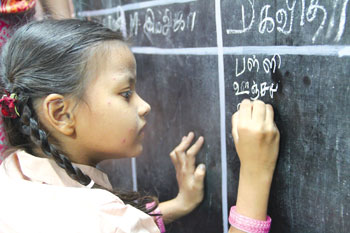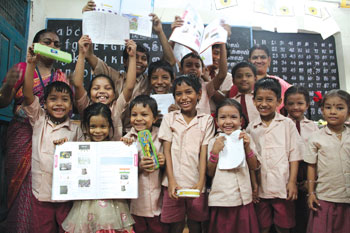First generation Tamil speakers of Nepali origin have embraced the language as their own

BHRIKUTI RAI
WORD BY WORD : Kavitha Dinesh is the first in her family to learn Tamil
Kavitha Dinesh’s nimble fingers move swiftly across the blackboard as she writes her name in English and Tamil. When she joined Chennai Primary, a Tamil-medium school in the quiet neighbourhood of Giriappa, in 2012 the six-year-old could hardly speak the language. Today not only is her Tamil more fluent than her Nepali, but she is also doing remarkably well in her classes.
Kavitha, whose father works as a gatekeeper, is among the 10 Nepali students at Chennai Primary. As private schools in the city become increasingly expensive, Nepali migrants most of who work temporary jobs as household helpers, waiters, and guards are compelled to send their children to public schools even though Tamil, not English, is used as the medium of instruction.
Teachers here admit that the first three months are the most difficult as the students feel more comfortable with fellow Nepalis. “They are first generation Tamil learners whose parents neither speak nor understand the language, so naturally it is difficult in the beginning,” explains Principal Rama Thyagrajan, “But once they get over their fear, they are surprisingly quick in picking up Tamil and their progress in and out of the classroom has been impressive.”

BHRIKUTI RAI
Nepali studennts' proficiency in Tamil has made them indistinguishable from local children.
Anil Nagari, one of the first Nepali students to be admitted at the school is now in Grade 5. Anil whose family is from Silagdi in Doti is currently the class captain and helps moderate parent-teacher meetings. “Without him we wouldn’t be able to communicate with Nepali parents,” admits Thyagrajan.
Anil’s father Jaggu Ram Nagari is a watchman at a clothing store in Pondi Bajar, Chennai’s thriving shopping district and is proud of his son’s accomplishment. “Now that my son is fluent in Tamil and English, I no longer feel shy visiting fancy malls,” he says. “I wish I could send him to a private school, but can’t afford it.” Nagari hopes his sons won’t have to toil on foreign soil like him and plans to get their Nepali citizenship cards soon.
Anil, like his Nepali peers, has only heard about his father’s land. He says: “I want to visit Nepal once, but I will come back because I want to play cricket for India like Dhoni.” He prefers speaking Tamil over Nepali and has also begun teaching the language to his mother.
The biggest challenge for Thyagrajan and her teachers now is to find a way to retain Nepali students because many keep switching schools as their parents move around in search of jobs, some don’t go back at all.
Chennai Express
Second grader Kabitha Dinesh reads from her Tamil text book
Moving Images
(
As a senior cameraman for Indian television networks, Bidesh Gharti Magar, 29, does not fit the stereotype of Nepali workers in India. Born to a working class family in Kerala, Magar’s father worked at an oil factory in Alleppey until 2002. While his parents moved home to Pyuthan, Magar came to Chennai and worked as an assistant cameraman for seven years at Sahara Samay, a national news channel.
Since 2008 he has been freelancing for different national news channels including Times Now, an English-language Indian news channel. “I have never felt discriminated at work because of my Nepali ethnicity,” admits Magar. Although he lived in Nepal for two years, the lack of job opportunities forced him back. Says the cameraman: “I would happily return to Nepal to my family if only the pay was as good as it is here.”